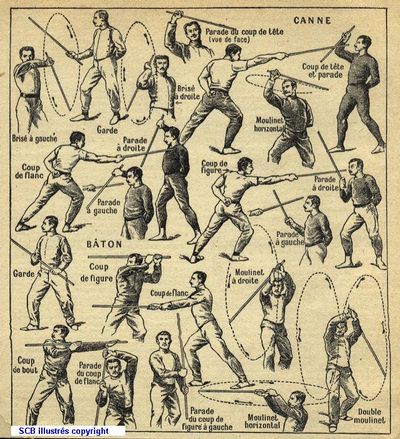More things I want to see in 7th Sea:
- Stick FIghting
- Puzzle Swords (one of the fun things from the 1e Montaigne sourcebook)
So with that in mind, I tried my hand at drafting up a couple of Duelist Styles for the new 7th Sea.
Lacanne
 The sword is the weapon of a gentle, but it is not always the right tool for the job. The roots of the Lacanne school can be found on docks across Theah, where dozens of different stick and club-fighting traditions evolved among sailors and dockworkers. It was treated as a set of tricks and techniques a gentle might use when fighting with cane, stick or staff, passed around and taught informally, but never recognized as a duelist style. This changed in late 1659 when Camilla Nieves, a minor daughter of Castillean nobility who had learned the style to circumvent her Father’s insistence she not learn the sword, beat eight different members of the Duelist’s Guild over the course of one summer, and it was deemed the least embarrassing course for the Guild to recognize the style. Until recently, it had been something of a footnote on the books of the Guild, but it has recently seen an upswing in popularity among Vesten who do not wish to look like warriors, but still wish to be capable of defending themselves.
The sword is the weapon of a gentle, but it is not always the right tool for the job. The roots of the Lacanne school can be found on docks across Theah, where dozens of different stick and club-fighting traditions evolved among sailors and dockworkers. It was treated as a set of tricks and techniques a gentle might use when fighting with cane, stick or staff, passed around and taught informally, but never recognized as a duelist style. This changed in late 1659 when Camilla Nieves, a minor daughter of Castillean nobility who had learned the style to circumvent her Father’s insistence she not learn the sword, beat eight different members of the Duelist’s Guild over the course of one summer, and it was deemed the least embarrassing course for the Guild to recognize the style. Until recently, it had been something of a footnote on the books of the Guild, but it has recently seen an upswing in popularity among Vesten who do not wish to look like warriors, but still wish to be capable of defending themselves.
Lacanne applies fencing maneuvers to fighting with canes and clubs. The signature weapon of the style is a weighted cane in the style a gentle might use, but it works equally well with any light club as long as a staff or as short as a baton.
Style Bonus: Spinning strike
When you wield a cane or baton in one or both hands, you can spin it with speed and force, sufficient to baffle and harm your enemies. You may perform a special Maneuver called Spinning Strike. Spinning Strike functions identically to either the Bash or Feint Maneuver. The Duelist chooses the effect of Spinning Strike when she performs it.
Rebus
 The Rebus school predates the Duelist’s Guild, albeit in slightly different form. Originally, it was a society of collectors and enthusiasts for “Puzzle Swords” – swords designed with clever extra mechanical trickery, like hidden blades, secret compartments full of flash powder, poison reservoirs and so on. The Rebus School focused on training duelists to take advantage of these tricks and surprises, and when the Duelist’s Guild was formed, it was quickly recognized.
The Rebus school predates the Duelist’s Guild, albeit in slightly different form. Originally, it was a society of collectors and enthusiasts for “Puzzle Swords” – swords designed with clever extra mechanical trickery, like hidden blades, secret compartments full of flash powder, poison reservoirs and so on. The Rebus School focused on training duelists to take advantage of these tricks and surprises, and when the Duelist’s Guild was formed, it was quickly recognized.
Historically, this school has largely been constrained to Montaigne, where most Puzzle Swords come from and where there is the most interest in such things. However, a new branch of practitioners has recently emerged among Scholars, most notably those members of the Invisible College who have found an urgent need to defend themselves. This “new school” does not use Puzzle Swords, but instead relies on other technological tricks, ranging from blade hidden in boots to spring loaded daggers up the sleeve. The split between the old and new school has inspired new tensions, but the new school has enough problems with the inquisition that it has not yet evolved into a full fledged schism.
Style Bonus: The Surprise
If armed with a hidden weapon or device (either in a Puzzle Sword or as a concealed Gadget), the duelist may perform a special maneuver called The Surprise as they reveal this hold out. The surprise may function as Slash, Parry, Feint, Lunge or Bash, depending on what form it takes. You may only perform The Surprise once per round.
Optional Rule: Preparation
By default, The Surprise assumes that the player will not be worrying about the details of the surprise until it’s revealed. That is, the player does not bother making note of what kind of gadget he has, and just describes it as it’s revealed. This may not suit every player well, especially those who like preparing these things, and for those players, this option exists.
If armed with a hidden weapon or device (either in a Puzzle Sword or as a concealed Gadget), the duelist declares what manner of device it is at the beginning of the round. When she performs the Surprise maneuver, it follows the rules of that particular type of gadget, as follows:
Danger: As Slash (Holdout weapons or hidden blades)
Defense: As Parry (Cunning crossguard, hidden armor)
Misdirect: Feint (Unexpected angles, hinges or chains)
Risky: Lunge (Launching blades or spikes)
Bafflement: Bash (Smoke cloud, flash-bang)
Once a particular gadget has been used, a new one may be declared at the start of the next round, and the duelist gains one extra die to build the new pool.
PS: If you haven’t, you should totally check out Rob Wieland’s thoughts on stories in 7th Sea!
I really like the idea of Lacanne. It opens up an opportunity for a very characterful PC or Villain without creating some secret game-breaking super weapon style. I immediately want to use it. Though, I think I would call the special maneuver carrete instead of “spinning strike”—Castillian (Spanish) version of moulinet. I can’t imagine a fencing teacher of student using a simple two word description for a technique when they could instead coin a specific term for it. Plus, it fits better with the rest of the 7th Sea schools that way.
I started digging deeper into the rule book last night after Rob Wieland’s post on stories, and I’m consistently struck by how every mechanic in this game seems designed to encourage storytelling, but also how it seems to ease some of the cognitive load of having to be creative for an entire session by making so much of the storytelling cue-driven and logically consistent. I really need to find a way to put my Strange campaign on hold so I can get this to the table with my group. I’m practically salivating at the thought.
Lacanne is certainly good, being both flavorful and offering a style bonus maneuver that isn’t too potent or over useful, and the two maneuvers it does mimic are useful if used in repetition without being overly so. Maybe call the special move the “Lacanne Spin” to follow the theme of the official schools (i.e. Aldana Ruse, Leegstra Crash, Valroux Cross)
Rebus’s style bonus maneuver is simply too good, and needs something more distinctive yet balanced. If anything, I might suggest having the Rebus style bonus giving a once per round bonus when using the Feint maneuver, such as replacing the standard +1 damage bonus to the subsequent maneuver with the duelist’s Wits. As for name, perhaps “Rebus Surprise”?
The interesting thing about the Rebus bonus is that (I think) it’s a lot less potent than it seems at first glance. There are plenty of styles that offer a move-alternative which effectively let you spam that move. Mirelli is a great example because you can efectively use bash or parry every single round. Leegstra offers a similar benefit benefit with slash, Torres with parry and so on. The tradeoff of rebus is you get greater flexibility, but only get one run of spam.
Of course, the counterargument is that a single round may be too short, and I’m sensitive to that. If 7th Sea had the equivalent of a “Scene”, I’d probably limit it by that, so if it ends up being an actual problem (which it might, but also might not) then I might well just add an in-fiction “preparation” requirement, so you get one surprise per fight, effectively.
The thing is, Mirelli and Leegstra only let the Duelist copy a very small set of maneuvers,, where your Rebus Surprise lets the Duelist copy everything but Riposte, making amazingly versatile and generally stomping all over the benefit of those two specific schools, especially Leegstra which can do their thing once per round anyway.
Mirelli’s Revision only mimics two maneuvers (Bash and Parry), neither of which are super-amazing, though consecutive Parry can be useful against high-damage opponents. Leegstra Crash mimics the Slash maneuver, one of the better maneuvers offered, but can only be done once per round.
Truthfully, if the restriction were “once per Scene” instead of “once per Round,” that would make it a whole lot better, as the Hero would need to plan carefully as to when they use it. But that also runs into the issue of them not being able to use their school’s “big trick” as often as the other schools can.
Or maybe alter the Rebus Surprise so that it’s similar to Mirelli’s Revision, only copying the Feint and Parry maneuvers, indicating a surprise attack or a surprise defense.
Hmm. Ok, I’m persuaded. I’ll come up with some wording to make it scene-based